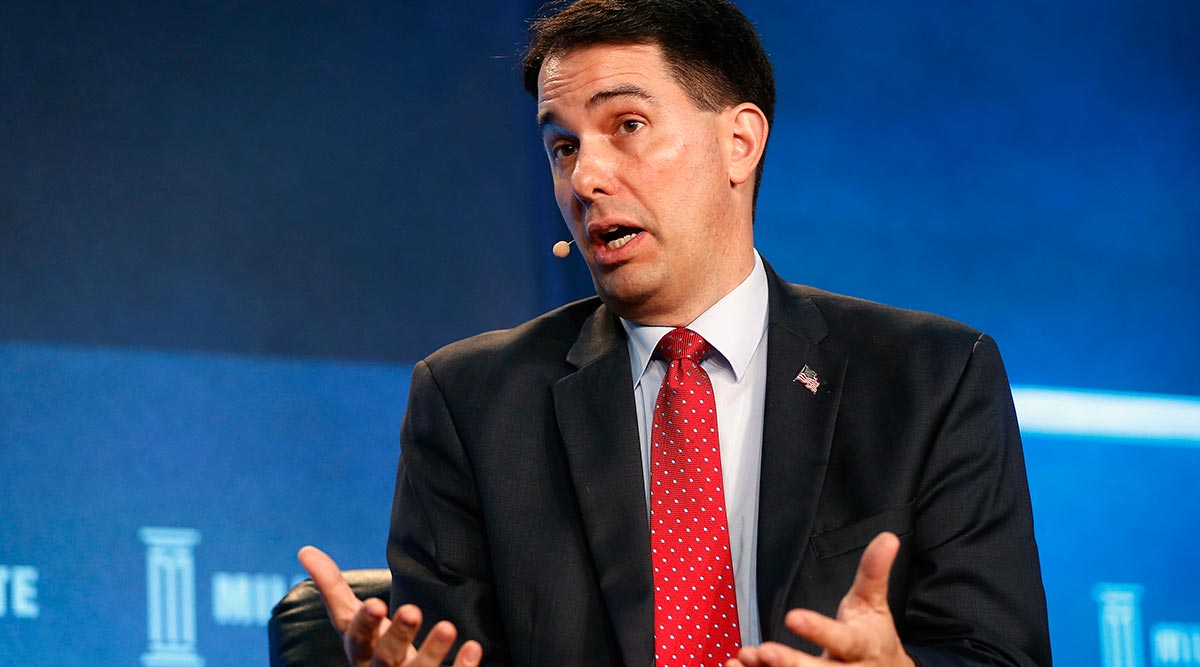Wisconsin Gov. Scott Walker Says He's Open to Tolling

Wisconsin Gov. Scott Walker signaled on May 30 that he’s open to charging tolls on Wisconsin’s interstates, but with a key condition: linking it to a reduction in the state’s 30.9-cents-per-gallon gasoline tax.
Walker also said an impasse over the state’s next transportation budget risks costly delays to billion-dollar highway projects now under construction. That includes a $1.2 billion expansion of Interstate 39/90 from the Madison area to the Illinois state line.
The interstate formed the backdrop for Walker’s remarks in a press conference at a Beloit rest stop.
Republicans who control the State Assembly have proposed seeking federal approval to toll interstates, which they say would help stabilize road and bridge finances in the long term. Interstate tolling would take years and hundreds of millions of dollars in upfront costs to implement. The first step would be to seek federal approval, the granting of which is not certain.
State Senate Majority Leader Scott Fitzgerald (R-Juneau) said in May that tolling “is something that needs to be explored.”
Walker said May 30 that a tolling plan “would be something we’d look at.”
“But it would have to include a reduction in the gasoline tax for Wisconsin residents,” Walker added. He did not specify how much of a reduction would be necessary.
Assembly Majority Leader Jim Steineke (R-Kaukauna) said Walker’s interest in tying tolling to a gasoline tax cut might be feasible if the result is a significant net increase in funding for transportation over the long term. Because tolling is a long-term proposition, it would not provide new revenue for the next state budget.
A July 1 deadline looms in budget talks; it’s the start of the state fiscal year and of the next two-year budget cycle.
“The only thing that would endanger the transportation part of the budget from getting done on time is if we don’t have willing partners in negotiation,” Steineke said. “Everyone knows in a negotiation, everyone has to give a little to get a little.”
Delays possible
Legislative Democrats and some Republicans say gasoline tax increases should be considered for the transportation budget.
The state faces a growing backlog of road and bridge projects, and many in both parties say it cannot continue to rely on borrowing and delaying projects to balance the funding ledger.
So Walker’s call to link tolling to a gasoline-tax cut may complicate already-fraught budget negotiations.
“It just seems like we’ve taken yet one more option off the table,” said Craig Thompson, director of the state Transportation Development Association, which advocates for more funding for roads, bridges and transit.
Fitzgerald, in a statement from a spokeswoman May 30, said he “would like to see tolling remain part of the conversation.”
“He continues to advocate for a legislative transportation solution that Gov. Walker will support,” Fitzgerald spokeswoman Myranda Tanck said.
Some Republican lawmakers have suggested splitting transportation from the larger state budget. Such a move could enable some Democrats to support the transportation measure and could give lawmakers more time to reach an agreement.
But Walker said May 30 that a budget split would delay work on some highway projects because it likely would mean there would be no new transportation budget in place by July 1.
If only a week or two passes after July 1 before Walker and lawmakers agree on a transportation budget, construction on ongoing major projects likely wouldn’t be affected, Walker said. In addition to the I-39/90 project, the projects include expansions of Verona Road from Raymond Road to McKee Road in the Madison area, of Highway 10/Highway 441 in the Fox Valley and of Highway 15 in Outagamie County.
But under several months’ delay, or if no new transportation budget were enacted at all, current funding levels would carry over into the next two-year cycle.
‘Tough decisions’
Under that scenario, Walker predicted all four active major highway projects would be affected. Which ones would be delayed, and by how much, would be decided by the state Department of Transportation, he said.
“Some tough decisions would have to be made by the Department of Transportation,” Walker said. “My message is simple: Let’s just get it done.”
Walker has proposed to fund all four major highway projects in progress in his budget proposal, keeping their construction on track for the next two years. However, it would come at the expense of large freeway projects in southeast Wisconsin, which would face a 70% funding reduction under the governor’s plan.
For months, the transportation debate has centered on whether to increase gasoline taxes or vehicle fees to ease the state’s backlog of road and bridge projects.
Walker opposes the move and proposed a budget that holds the line on taxes and fees. The plan relies on $500 million in borrowing — a problem for some legislative Republicans wary of putting more on the state’s credit card.
He cited a new memo from the nonpartisan Legislative Fiscal Bureau saying the state’s transportation fund, filled mostly by gas taxes and vehicle fees, is expected to end the next budget cycle, from 2017-19, with more than $93 million more than previously projected. That’s due to revised projections of higher gas tax revenues and lower debt service costs, the bureau said.
The I-39-90 project is the costliest of the ongoing major projects. Walker repeatedly has described it as a priority project to move tourist traffic into Wisconsin and for businesses along the corridor, which goes through Beloit, Janesville and Madison.
Not included in the $1.2 billion estimate for the project is the reconstruction of the Madison Beltline interchange with I-39/90, which was part of its original scope. DOT Secretary Dave Ross has said the department’s estimate for that part of the project, $550 million, is “totally unacceptable” and the department will re-evaluate it. Senate Democratic Leader Jennifer Shilling (D-La Crosse) said in a statement that legislative Democrats want a long-term solution to pay for roads.




